Article Analysis: Middle Management, Culture, and Whistleblower Issues
VerifiedAdded on 2023/06/07
|6
|1179
|379
Report
AI Summary
This report provides an analysis of three articles focusing on critical aspects of organizational behavior and management. The first article delves into the complexities of middle management, examining contrasting views and the need for a social constructionist framework to understand the evolving roles and identities within contemporary organizations. It addresses epistemological shortcomings by incorporating wider macrostructural levels and highlighting the shift to micro levels while critiquing management and organizational research. The second article explores the impact of organizational culture on corruption, identifying characteristics that correlate with unethical behavior and employee engagement in corrupt practices. It emphasizes the role of values, assumptions, and norms in shaping employee behavior and the importance of management in controlling behavioral systems. The third article investigates the experiences of whistleblowers, focusing on the concept of "impossible speech" and how individuals speaking out against corruption are often excluded from their professions. It utilizes Butler's theories of recognition and censorship to analyze the dynamics of subject positions and the challenges faced by whistleblowers, contributing to organizational studies by offering a performative ontology of excluded whistleblower subjects.
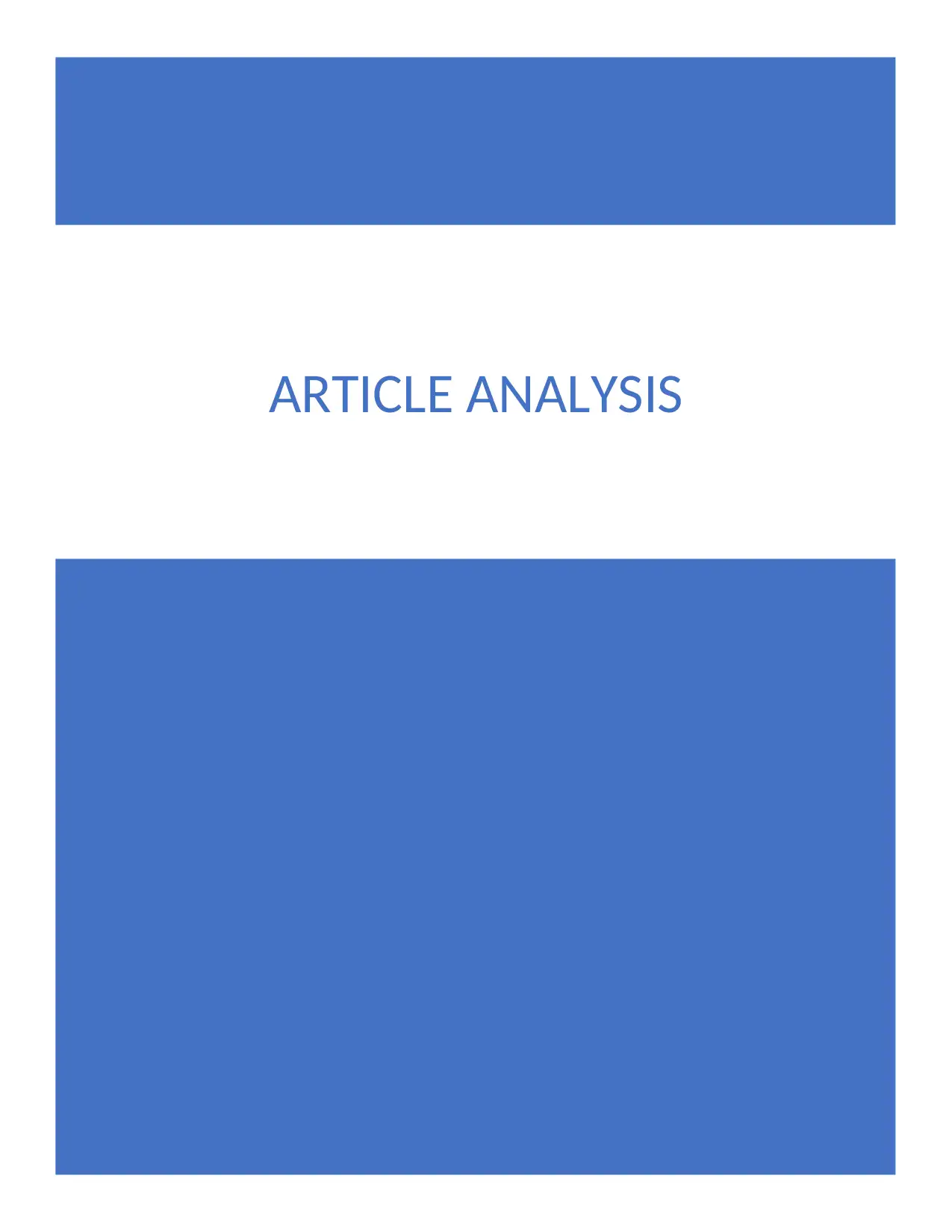
ARTICLE ANALYSIS
Paraphrase This Document
Need a fresh take? Get an instant paraphrase of this document with our AI Paraphraser
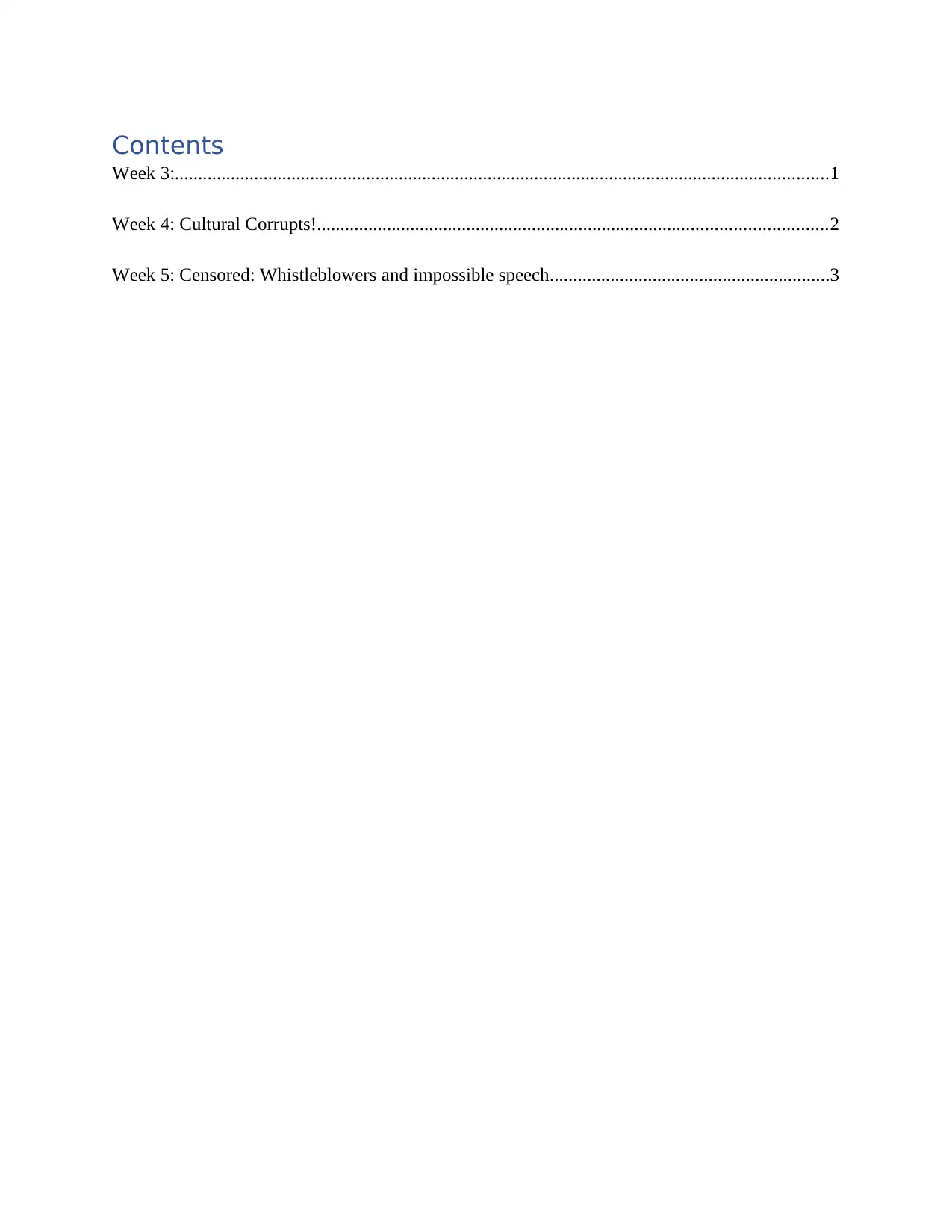
Contents
Week 3:............................................................................................................................................1
Week 4: Cultural Corrupts!.............................................................................................................2
Week 5: Censored: Whistleblowers and impossible speech............................................................3
Week 3:............................................................................................................................................1
Week 4: Cultural Corrupts!.............................................................................................................2
Week 5: Censored: Whistleblowers and impossible speech............................................................3
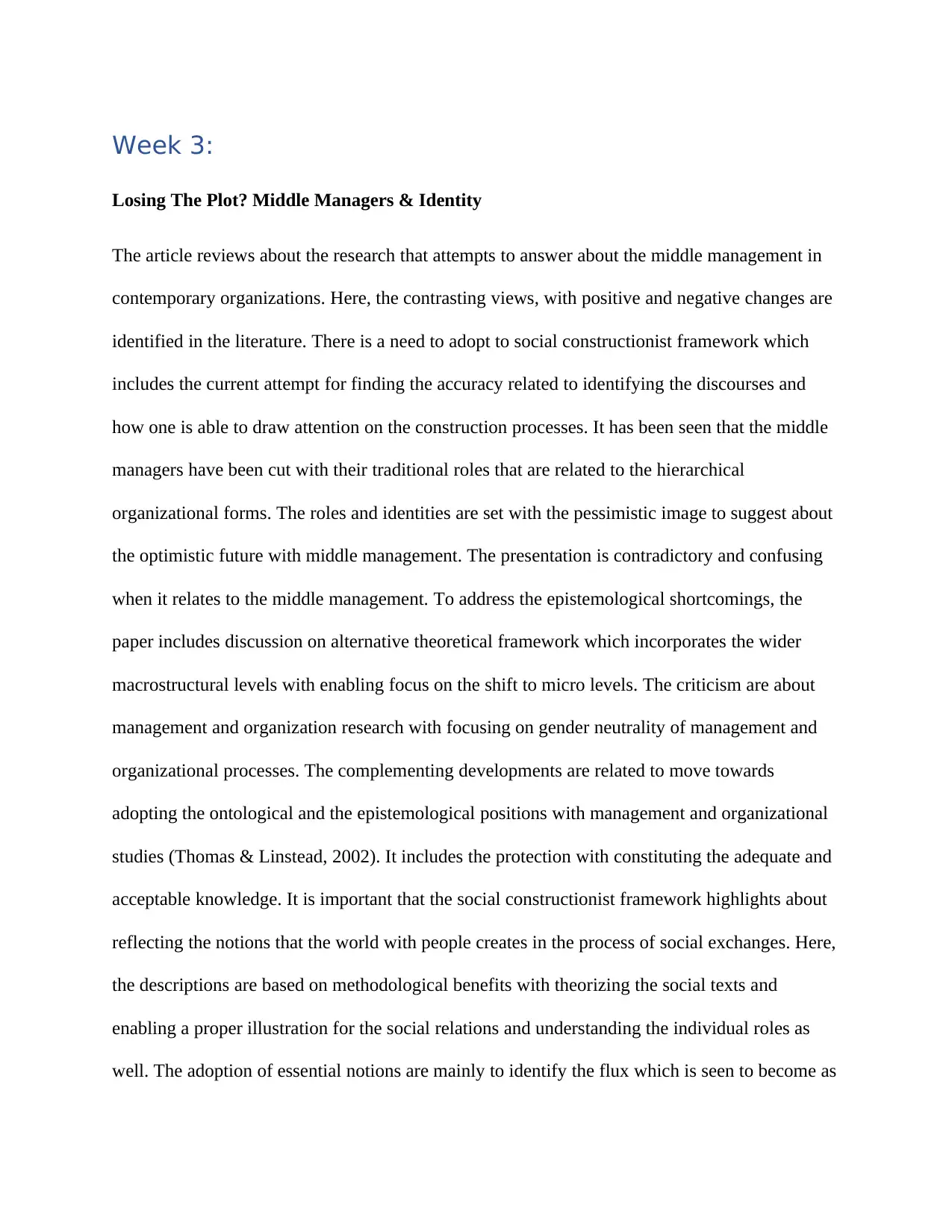
Week 3:
Losing The Plot? Middle Managers & Identity
The article reviews about the research that attempts to answer about the middle management in
contemporary organizations. Here, the contrasting views, with positive and negative changes are
identified in the literature. There is a need to adopt to social constructionist framework which
includes the current attempt for finding the accuracy related to identifying the discourses and
how one is able to draw attention on the construction processes. It has been seen that the middle
managers have been cut with their traditional roles that are related to the hierarchical
organizational forms. The roles and identities are set with the pessimistic image to suggest about
the optimistic future with middle management. The presentation is contradictory and confusing
when it relates to the middle management. To address the epistemological shortcomings, the
paper includes discussion on alternative theoretical framework which incorporates the wider
macrostructural levels with enabling focus on the shift to micro levels. The criticism are about
management and organization research with focusing on gender neutrality of management and
organizational processes. The complementing developments are related to move towards
adopting the ontological and the epistemological positions with management and organizational
studies (Thomas & Linstead, 2002). It includes the protection with constituting the adequate and
acceptable knowledge. It is important that the social constructionist framework highlights about
reflecting the notions that the world with people creates in the process of social exchanges. Here,
the descriptions are based on methodological benefits with theorizing the social texts and
enabling a proper illustration for the social relations and understanding the individual roles as
well. The adoption of essential notions are mainly to identify the flux which is seen to become as
Losing The Plot? Middle Managers & Identity
The article reviews about the research that attempts to answer about the middle management in
contemporary organizations. Here, the contrasting views, with positive and negative changes are
identified in the literature. There is a need to adopt to social constructionist framework which
includes the current attempt for finding the accuracy related to identifying the discourses and
how one is able to draw attention on the construction processes. It has been seen that the middle
managers have been cut with their traditional roles that are related to the hierarchical
organizational forms. The roles and identities are set with the pessimistic image to suggest about
the optimistic future with middle management. The presentation is contradictory and confusing
when it relates to the middle management. To address the epistemological shortcomings, the
paper includes discussion on alternative theoretical framework which incorporates the wider
macrostructural levels with enabling focus on the shift to micro levels. The criticism are about
management and organization research with focusing on gender neutrality of management and
organizational processes. The complementing developments are related to move towards
adopting the ontological and the epistemological positions with management and organizational
studies (Thomas & Linstead, 2002). It includes the protection with constituting the adequate and
acceptable knowledge. It is important that the social constructionist framework highlights about
reflecting the notions that the world with people creates in the process of social exchanges. Here,
the descriptions are based on methodological benefits with theorizing the social texts and
enabling a proper illustration for the social relations and understanding the individual roles as
well. The adoption of essential notions are mainly to identify the flux which is seen to become as
⊘ This is a preview!⊘
Do you want full access?
Subscribe today to unlock all pages.

Trusted by 1+ million students worldwide
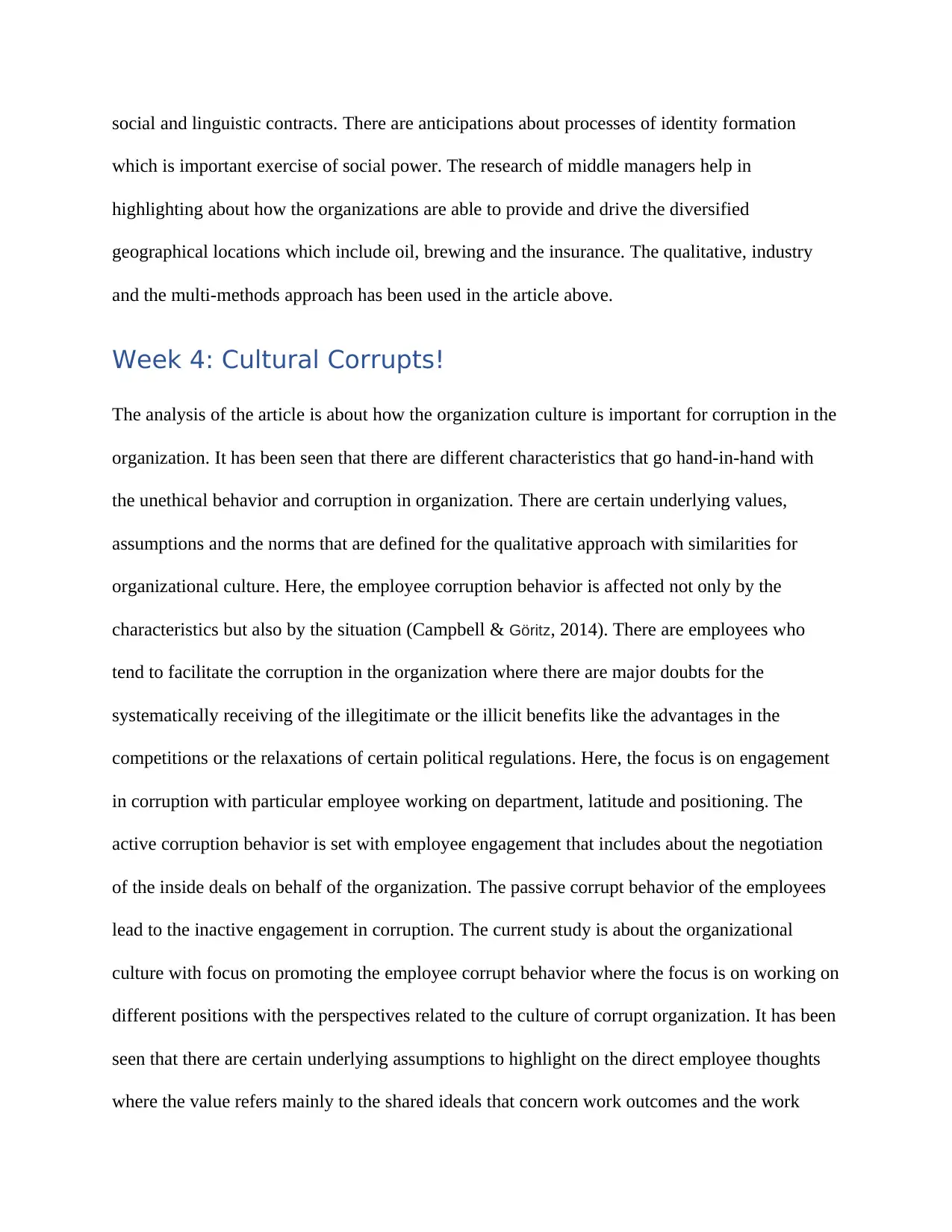
social and linguistic contracts. There are anticipations about processes of identity formation
which is important exercise of social power. The research of middle managers help in
highlighting about how the organizations are able to provide and drive the diversified
geographical locations which include oil, brewing and the insurance. The qualitative, industry
and the multi-methods approach has been used in the article above.
Week 4: Cultural Corrupts!
The analysis of the article is about how the organization culture is important for corruption in the
organization. It has been seen that there are different characteristics that go hand-in-hand with
the unethical behavior and corruption in organization. There are certain underlying values,
assumptions and the norms that are defined for the qualitative approach with similarities for
organizational culture. Here, the employee corruption behavior is affected not only by the
characteristics but also by the situation (Campbell & Göritz, 2014). There are employees who
tend to facilitate the corruption in the organization where there are major doubts for the
systematically receiving of the illegitimate or the illicit benefits like the advantages in the
competitions or the relaxations of certain political regulations. Here, the focus is on engagement
in corruption with particular employee working on department, latitude and positioning. The
active corruption behavior is set with employee engagement that includes about the negotiation
of the inside deals on behalf of the organization. The passive corrupt behavior of the employees
lead to the inactive engagement in corruption. The current study is about the organizational
culture with focus on promoting the employee corrupt behavior where the focus is on working on
different positions with the perspectives related to the culture of corrupt organization. It has been
seen that there are certain underlying assumptions to highlight on the direct employee thoughts
where the value refers mainly to the shared ideals that concern work outcomes and the work
which is important exercise of social power. The research of middle managers help in
highlighting about how the organizations are able to provide and drive the diversified
geographical locations which include oil, brewing and the insurance. The qualitative, industry
and the multi-methods approach has been used in the article above.
Week 4: Cultural Corrupts!
The analysis of the article is about how the organization culture is important for corruption in the
organization. It has been seen that there are different characteristics that go hand-in-hand with
the unethical behavior and corruption in organization. There are certain underlying values,
assumptions and the norms that are defined for the qualitative approach with similarities for
organizational culture. Here, the employee corruption behavior is affected not only by the
characteristics but also by the situation (Campbell & Göritz, 2014). There are employees who
tend to facilitate the corruption in the organization where there are major doubts for the
systematically receiving of the illegitimate or the illicit benefits like the advantages in the
competitions or the relaxations of certain political regulations. Here, the focus is on engagement
in corruption with particular employee working on department, latitude and positioning. The
active corruption behavior is set with employee engagement that includes about the negotiation
of the inside deals on behalf of the organization. The passive corrupt behavior of the employees
lead to the inactive engagement in corruption. The current study is about the organizational
culture with focus on promoting the employee corrupt behavior where the focus is on working on
different positions with the perspectives related to the culture of corrupt organization. It has been
seen that there are certain underlying assumptions to highlight on the direct employee thoughts
where the value refers mainly to the shared ideals that concern work outcomes and the work
Paraphrase This Document
Need a fresh take? Get an instant paraphrase of this document with our AI Paraphraser
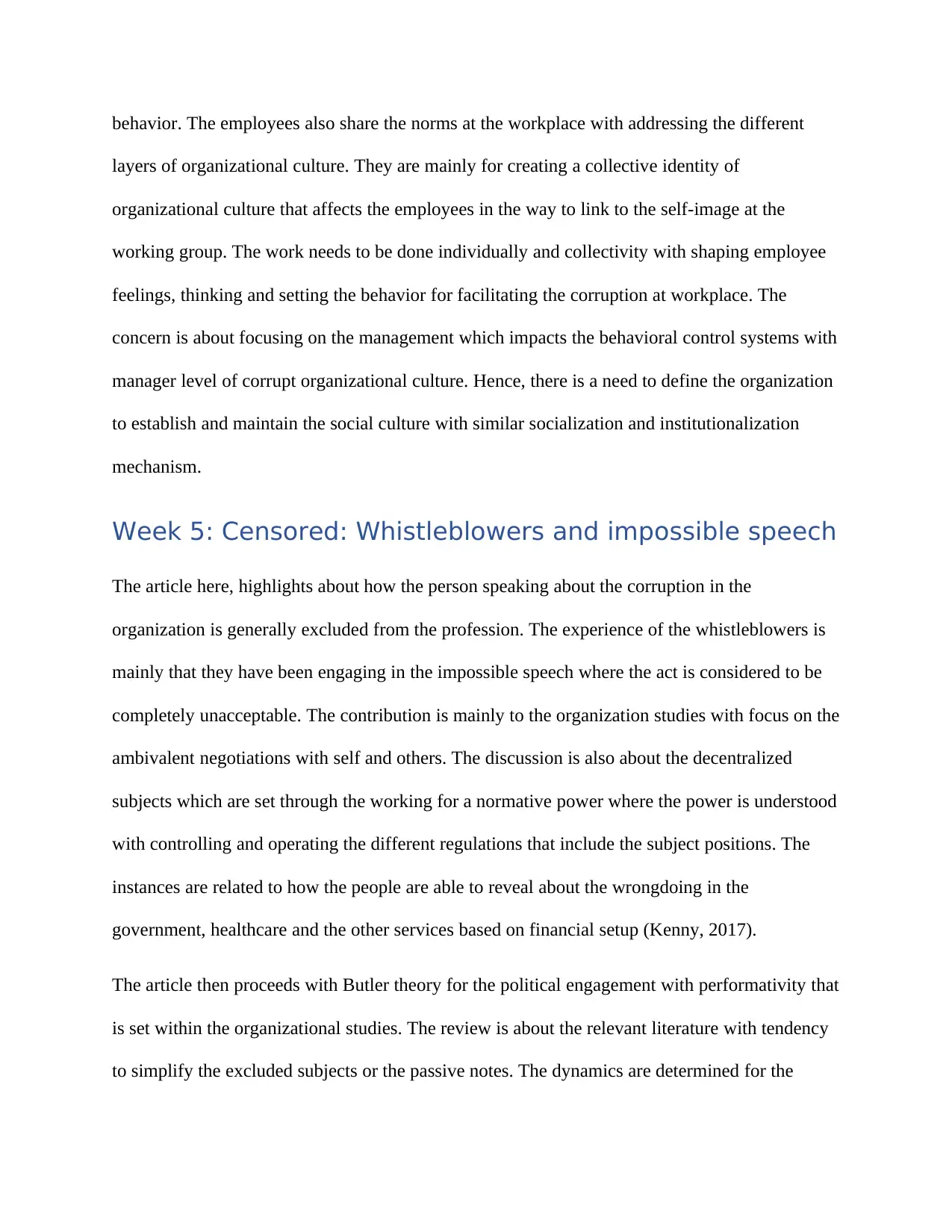
behavior. The employees also share the norms at the workplace with addressing the different
layers of organizational culture. They are mainly for creating a collective identity of
organizational culture that affects the employees in the way to link to the self-image at the
working group. The work needs to be done individually and collectivity with shaping employee
feelings, thinking and setting the behavior for facilitating the corruption at workplace. The
concern is about focusing on the management which impacts the behavioral control systems with
manager level of corrupt organizational culture. Hence, there is a need to define the organization
to establish and maintain the social culture with similar socialization and institutionalization
mechanism.
Week 5: Censored: Whistleblowers and impossible speech
The article here, highlights about how the person speaking about the corruption in the
organization is generally excluded from the profession. The experience of the whistleblowers is
mainly that they have been engaging in the impossible speech where the act is considered to be
completely unacceptable. The contribution is mainly to the organization studies with focus on the
ambivalent negotiations with self and others. The discussion is also about the decentralized
subjects which are set through the working for a normative power where the power is understood
with controlling and operating the different regulations that include the subject positions. The
instances are related to how the people are able to reveal about the wrongdoing in the
government, healthcare and the other services based on financial setup (Kenny, 2017).
The article then proceeds with Butler theory for the political engagement with performativity that
is set within the organizational studies. The review is about the relevant literature with tendency
to simplify the excluded subjects or the passive notes. The dynamics are determined for the
layers of organizational culture. They are mainly for creating a collective identity of
organizational culture that affects the employees in the way to link to the self-image at the
working group. The work needs to be done individually and collectivity with shaping employee
feelings, thinking and setting the behavior for facilitating the corruption at workplace. The
concern is about focusing on the management which impacts the behavioral control systems with
manager level of corrupt organizational culture. Hence, there is a need to define the organization
to establish and maintain the social culture with similar socialization and institutionalization
mechanism.
Week 5: Censored: Whistleblowers and impossible speech
The article here, highlights about how the person speaking about the corruption in the
organization is generally excluded from the profession. The experience of the whistleblowers is
mainly that they have been engaging in the impossible speech where the act is considered to be
completely unacceptable. The contribution is mainly to the organization studies with focus on the
ambivalent negotiations with self and others. The discussion is also about the decentralized
subjects which are set through the working for a normative power where the power is understood
with controlling and operating the different regulations that include the subject positions. The
instances are related to how the people are able to reveal about the wrongdoing in the
government, healthcare and the other services based on financial setup (Kenny, 2017).
The article then proceeds with Butler theory for the political engagement with performativity that
is set within the organizational studies. The review is about the relevant literature with tendency
to simplify the excluded subjects or the passive notes. The dynamics are determined for the
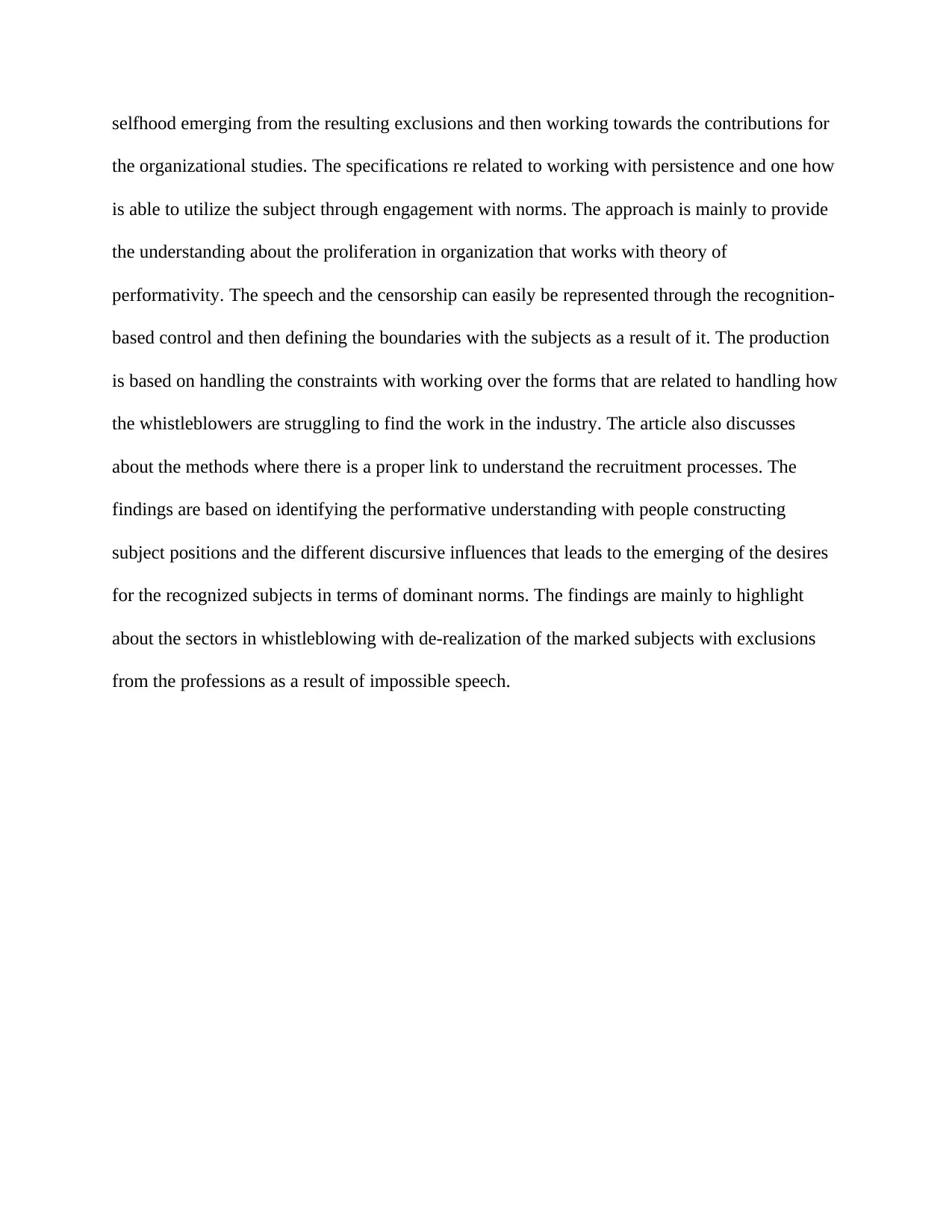
selfhood emerging from the resulting exclusions and then working towards the contributions for
the organizational studies. The specifications re related to working with persistence and one how
is able to utilize the subject through engagement with norms. The approach is mainly to provide
the understanding about the proliferation in organization that works with theory of
performativity. The speech and the censorship can easily be represented through the recognition-
based control and then defining the boundaries with the subjects as a result of it. The production
is based on handling the constraints with working over the forms that are related to handling how
the whistleblowers are struggling to find the work in the industry. The article also discusses
about the methods where there is a proper link to understand the recruitment processes. The
findings are based on identifying the performative understanding with people constructing
subject positions and the different discursive influences that leads to the emerging of the desires
for the recognized subjects in terms of dominant norms. The findings are mainly to highlight
about the sectors in whistleblowing with de-realization of the marked subjects with exclusions
from the professions as a result of impossible speech.
the organizational studies. The specifications re related to working with persistence and one how
is able to utilize the subject through engagement with norms. The approach is mainly to provide
the understanding about the proliferation in organization that works with theory of
performativity. The speech and the censorship can easily be represented through the recognition-
based control and then defining the boundaries with the subjects as a result of it. The production
is based on handling the constraints with working over the forms that are related to handling how
the whistleblowers are struggling to find the work in the industry. The article also discusses
about the methods where there is a proper link to understand the recruitment processes. The
findings are based on identifying the performative understanding with people constructing
subject positions and the different discursive influences that leads to the emerging of the desires
for the recognized subjects in terms of dominant norms. The findings are mainly to highlight
about the sectors in whistleblowing with de-realization of the marked subjects with exclusions
from the professions as a result of impossible speech.
⊘ This is a preview!⊘
Do you want full access?
Subscribe today to unlock all pages.

Trusted by 1+ million students worldwide
1 out of 6
Related Documents
Your All-in-One AI-Powered Toolkit for Academic Success.
+13062052269
info@desklib.com
Available 24*7 on WhatsApp / Email
![[object Object]](/_next/static/media/star-bottom.7253800d.svg)
Unlock your academic potential
Copyright © 2020–2025 A2Z Services. All Rights Reserved. Developed and managed by ZUCOL.





